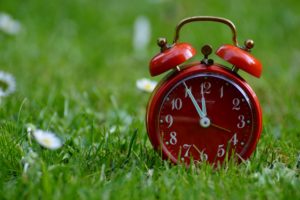In today’s arguably hyper-materialist world we are often fed the idea that stuff will make us happy: if only we could get that latest phone, that new TV, that great new pair of shoes, happiness would be ours! Or so the marketing messaging goes.
However, an increasing amount of research tells us that this is simply not the case; that, in fact, free time and positive experiences give us more happiness and wellbeing than new stuff can offer.
Time is the most valuable currency
Recently the BBC has shared an extensive international study of 6,000 adults, which has shown that if you want higher life satisfaction, you’d be better off spending your money to gain more time, rather than more stuff.
However, on reading the BBC’s analysis I couldn’t help but wonder: rather than using money to buy back our time, why not try to spend less time in the first place? There is lots of evidence showing the wellbeing benefits of a shorter working week, and so if you want to be happier, working less seems a better place to start than paying others to do your chores for you.

The approach of trying to buy back what is initially freely available to us – namely, time – reminds me of the story of the fisherman and the investment banker. In brief, the story is that the banker tries to encourage the fisherman to use all of his free time to fish more and maximize his profits, in order to eventually earn enough money to relax and enjoy… his free time! It is helpful to avoid getting caught in this ironic tale ourselves, by knowing that not all things of value have a price tag.
That said, both ‘buying back’ our time (through employing others to do tasks we don’t want to do) and working less are actually luxuries, which are unaffordable and unrealistic for many people. However, no matter what your income, it is still important to remember that stuff is not the most reliable source of happiness.
Experiences are more valuable than stuff
James Wallman, author of the book Stuffocation, says that instead of looking for happiness, status and meaning in material things, we can now find these things in experiences instead. He talks about ‘experientialism’ replacing materialism, and how this shift can be good for us and for wider society.
Experiences needn’t cost much money: It doesn’t cost anything to enjoy a long walk outside or a good chat with a friend or family member. And experiences needn’t even cost too much time: You can simply spend your lunch break in the local park or spend ten minutes in mindfulness each morning. Or you could even give your full attention to deeply enjoying your cup of tea (as the very wise Rowan Williams has suggested).

Overall, the research is clear: If you want to be happier, give more focus to enjoying free time and experiences, rather than focusing on any new stuff you want to buy.
What do you think? How do you gain free time? And what free or short experiences do you enjoy? Share your reflections in the comments, or on social media.

